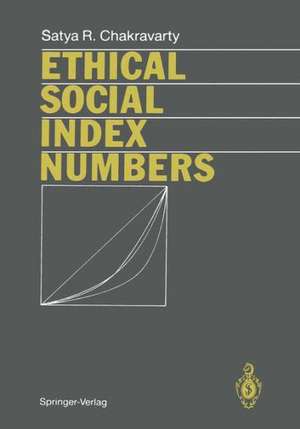Ethical Social Index Numbers
Autor Satya R. Chakravartyen Limba Engleză Paperback – 6 dec 2011
Preț: 644.18 lei
Preț vechi: 757.85 lei
-15% Nou
Puncte Express: 966
Preț estimativ în valută:
123.27€ • 131.81$ • 102.77£
123.27€ • 131.81$ • 102.77£
Carte tipărită la comandă
Livrare economică 18 aprilie-02 mai
Preluare comenzi: 021 569.72.76
Specificații
ISBN-13: 9783642755040
ISBN-10: 3642755046
Pagini: 328
Ilustrații: XII, 309 p.
Dimensiuni: 170 x 242 x 17 mm
Greutate: 0.52 kg
Ediția:Softcover reprint of the original 1st ed. 1990
Editura: Springer Berlin, Heidelberg
Colecția Springer
Locul publicării:Berlin, Heidelberg, Germany
ISBN-10: 3642755046
Pagini: 328
Ilustrații: XII, 309 p.
Dimensiuni: 170 x 242 x 17 mm
Greutate: 0.52 kg
Ediția:Softcover reprint of the original 1st ed. 1990
Editura: Springer Berlin, Heidelberg
Colecția Springer
Locul publicării:Berlin, Heidelberg, Germany
Public țintă
ResearchCuprins
1: On Quasi-Orderings of Income Profiles.- 1.1 Introduction.- 1.2 Social Evaluation (Welfare) Functions and their Arguments.- 1.3 Some Definitions.- 1.4 The Lorenz Quasi-Ordering.- 1.5 Some Alternative Quasi-Orderings.- 1.6 Concluding Remarks.- 2: Ethical Indices of Inequality.- 2.1 Introduction.- 2.2 Postulates for the Selection of an Index of Inequality.- 2.3 Cardinally Significant Ethical Indices of Relative Inequality.- 2.4 Cardinally Significant Ethical Indices of Absolute and Intermediate Inequality.- 2.5 Inequality as an Ordinal Concept.- 2.6 Decomposition of Inequality Indices by Population Subgroups and by Factor Components.- 2.7 Concluding Remarks.- 3: The Gini Indices of Inequality.- 3.1 Introduction.- 3.2 A Formal Definition of the Lorenz Curve for a Continuum of Population.- 3.3 A General Definition of the Lorenz Curve.- 3.4 An Extension of the Gini Index of Relative Inequality.- 3.5 Alternative Generalisations of the Gini Index.- 3.6 Empirical Estimation of Inequality Indices from Grouped Data.- 3.7 Concluding Remarks.- 4: Ethical Indices of Distance Between Income Profiles.- 4.1 Introduction.- 4.2 Ethically Coherent Distance Functions.- 4.3 A Characterisation Theorem.- 4.4 Concluding Remarks.- 5: The Measurement of Relative Deprivation.- 5.1 Introduction.- 5.2 A Simple Index of Relative Deprivation and the Implied Welfare Ordering.- 5.3 Ethical Indices of Relative Deprivation.- 5.4 Concluding Remarks.- 6: Ethically Flexible Indices of Poverty.- 6.1 Introduction.- 6.2 Properties for an Index of Poverty.- 6.3 Relative Indices of Poverty.- 6.4 Absolute Indices of Poverty.- 6.5 Concluding Remarks.- 7: Additively Decomposable Indices of Poverty.- 7.1 Introduction.- 7.2 Decomposability.- 7.3 Additively Decomposable Indices of Poverty.- 7.4 Empirical Estimationof Poverty Indices from Grouped Data.- 7.5 Concluding Remarks.- 8: Measurement of Tax Progressivity and Horizontal Inequity.- 8.1 Introduction.- 8.2 Indices of Local Progression.- 8.3 An Ethical Index of Global Tax Progressivity.- 8.4 Ethical Indices for the Measurement of Horizontal Inequity.- 8.5 Alternative Indices of Tax Progressivity and Horizontal Inequity.- 8.6 Concluding Remarks.- 9: Ethical Indices of Income Mobility.- 9.1 Introduction.- 9.2 Ethical Indices of Relative Mobility.- 9.3 Alternative Concepts of Mobility.- 9.4 Concluding Remarks.- Extended Bibliography.
























